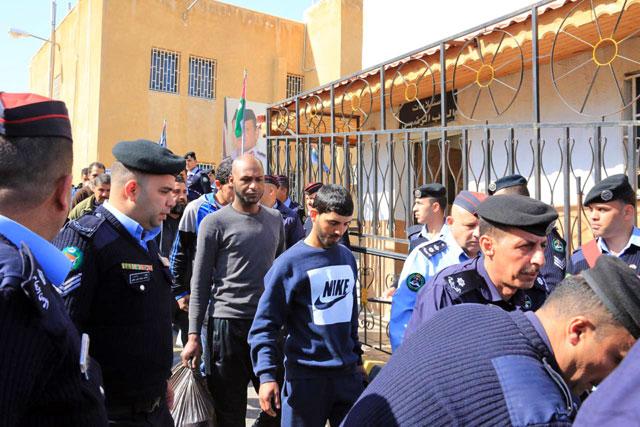You are here
Hundreds of detainees released as pardon goes into effect
By JT - Feb 05,2019 - Last updated at Feb 05,2019

Scores of inmates were released on Tuesday as the 2018 General Pardon Law went into effect. Officials said the releases would continue until the law is fully implemented (Petra photos)
AMMAN — Hundreds of detainees were released on Tuesday as the General Pardon Law went into effect upon its publication in a special issue of the Official Gazette.
A Royal Decree was issued on Monday ratifying the 2018 General Pardon Law as endorsed by the Senate and the Lower House.
Following the publication of the law in the Official Gazette, attorney general apparatuses started releasing all those who are included in the General Pardon Law, the Jordan News Agency, Petra, reported.
Head of the Attorney General’s Office, Judge Mohammad Shraideh, during a visit to the Swaqa Correction and Rehabilitation Centre, said that the work of the attorney general apparatuses will continue until the law is fully implemented.
As worded by lawmakers, acts of defamation, slander and contempt stipulated in the Cybercrime Law, violations to residency and foreigner affairs and the labour laws, fines for breaches related to the income, sales and customs laws in addition to traffic violation fines and drug-related crimes, with a number of exceptions, are pardoned under the law, regardless of whether victims’ personal rights are waived or not.
The Labour Ministry on Tuesday said that the law does not include labour permit fees, which the ministry receives from employers when issuing or renewing permits, even with retroactive effect.
Following the issuance of the law, Maan Governor Ahmad Omoush decided to release eight administrative detainees, while police surveillance has been lifted from 53 people in the governorate following instructions from Interior Minister Samir Mubaidin in line with the law’s provisions, according to Petra.
Balqa Governor Nayef Hidayat decided to release 88 administrative detainees who had been apprehended before December 12, the day on which His Majesty King Abdullah directed the government to issue the General Pardon Law.
Jerash’s governor decided to release 35 administrative detainees, while Irbid Governor Radwan Otoum instructed authorities to proceed with legal procedures to release 23 detainees and Tafileh’s governor, Hussam Tarawneh, ordered the release of four detainees.
Ajloun Governor Ali Majali, Madaba Governor Hassan Qayyam and Mafraq Governor Yasser Adwan directed authorities to release 18, 30 and 37 detainees in their respective governorates.
Karak Governor Jamal Fayez decided to release 38 detainees and Aqaba Governor Saleh Nasarat instructed authorities to free 49 detainees.
Amman Governor Saad Shihab also ordered the release of 873 administrative detainees, according to Petra.
Among the crimes excluded from the general pardon are those related to state security, forming or joining illegal organisations and espionage, in addition to economic crimes, graft, rape, terrorism and violations of the duties of public office.
The General Pardon Law, as per the King’s directives, is aimed at “entrenching the concept of tolerance and forgiveness, enhancing societal security, easing hardship and pressures faced by citizens, giving convicts and wrongdoers a second chance to correct their conduct and encouraging them to play their natural role and ensure their permanent integration in society”.
Related Articles
AMMAN — The general pardon bill was passed by the Senate on Tuesday as referred by the Lower House, and is awaiting His Majesty King Abdulla
AMMAN — Attorney General Judge Yousef Thiabat on Sunday said that the General Pardon Law has offered a fresh opportunity for reform to 8,454
AMMAN — Interior Minister Salameh Hammad on Wednesday instructed administrative governors to release 426 administrative detainees.











